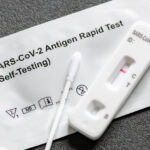TFAH Statement: Budget Proposes Devastating Cuts for Public Health
Washington, D.C., March 16, 2017 – The below is a statement from John Auerbach, president and CEO, of Trust for America’s Health (TFAH).
“The President’s proposed budget – which includes nearly an 18 percent cut to the Department of Health and Human Services (HHS) – would be devastating to the public health and safety of Americans. This would constitute an unprecedented harmful blow to the nation’s health.
While there are not sufficient details in the budget blueprint about the impact to HHS agencies, including at the Centers for Disease Control and Prevention (CDC), it is clear that such a big decrease would undercut core health programs that are needed to address any and all health problems.
There is nothing more valuable than the health and vitality of the American people. To achieve that, we need to maintain a strong and stable public health system. Such significant cuts would hurt the country’s health system – which is essential for taking on the range of epidemics we face – from major disease outbreaks to diabetes to prescription painkiller misuse.
A few CDC-specific areas referenced in the budget blueprint include:
- A proposal for a $500 million block grant program for states via CDC. The proposal does not provide specifics about the program or where the funds would come from, beyond encouraging flexibility for states to focus on their leading public health challenges. We would raise major concerns that in the past – when funding sources have been combined, they have also been reduced – leaving states with less funding and with less ability to address the health problems of their citizens. States then end up in a position of having to make tough trade-offs about which health problems they can address.
- The creation of a Federal Emergency Response Fund. The document, however, does not provide sufficient information to evaluate what the fund would look like or if there would be new resources to support it, or if support would be diverted at the expense of funding for other programs. While creating such a fund is important – to allow for access to immediate funds during health emergencies – it is essential that such a fund be supplemental – and not come at the expense or instead of maintaining an ongoing public health security and defense programs. We need both steady ongoing capabilities – as well as the ability to quickly access emergency supplemental funds in times of crises.
- 500 million to address the opioid epidemic. A national commitment to this priority health crisis is important. However, the budget proposal was unclear as to whether these are new funds, funds that came from passage of the CURES bill or funds diverted from other programs. In addition to specific funding to address the crisis, it is also essential to maintain and sufficiently support the underlying public health system that any response would build upon.
Proposed cuts to other agencies and programs also threaten to adversely impact the health of Americans. For instance, the 31 percent proposed cut to the Environmental Protection Agency (EPA) could potentially roll back decades of progress protecting against the health impacts of air and water pollution. And, stable and secure housing is a major factor for maintaining good health – and the proposed 13 percent cut to the Department of Housing and Urban Development (HUD), including eliminating the Community Development Block Grant program, would contribute to harming the health and stability of numerous vulnerable families.
These cuts would be historically damaging to our nation’s health. The country is at a crossroads – where we have the knowledge and capability to help Americans have healthier, longer lives – but if we don’t invest and maintain these efforts, we will be taking a turn down the wrong path. The lives of our families are too valuable, and the stakes are too high to undercut our health and wellbeing.”
Trust for America’s Health is a non-profit, non-partisan organization dedicated to saving lives by protecting the health of every community and working to make disease prevention a national priority.
###

